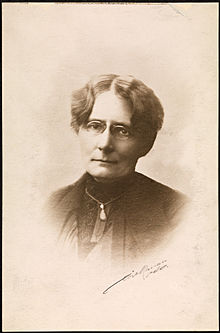Fernanda Nissen
Fernanda Nissen | |
|---|---|
 | |
| Born | Petra Gregorine Fernanda Thomesen 15 August 1862 Sannidal, Norway |
| Died | 3 April 1920 (aged 57) Barmen, Germany |
| Nationality | Norwegian |
| Occupation | Teacher Journalist Literary critic Theatre critic Magazine editor Public film censor Trade unionist Politician |
| Spouse(s) | Lars Holst Oscar Nissen |
| Parent(s) | Thomes Thomesen |
| Relatives | Ole Thomesen (uncle) Erik Werenskiold (brother-in-law) Werner Werenskiold (nephew) Dagfin Werenskiold (nephew) |
Petra Gregorine Fernanda Nissen (née Thomesen; 15 August 1862 – 3 April 1920) was a Norwegian journalist, literary critic, theatre critic, politician and feminist pioneer.
Early and personal life[]
Fernanda Thomesen was born in Sannidal, as the daughter of ship owner and consul Thomes Thomesen and Bertha Marthine Olea Debes. She was a niece of Ole Thomesen.[1]
She was married to newspaper editor and politician Lars Holst from 1882 to 1895, and to physician Oscar Egede Nissen from 1895 to 1911.[1] Through her sister Sophie, she was sister-in-law of painter and illustrator Erik Werenskiold, and an aunt of Werner and Dagfin Werenskiold.[2]
Career[]
Nissen worked several years as a teacher, and later journalist. She was journalist for Dagbladet in the 1880s, and literary critic and theatre critic for the newspaper Social-Demokraten from 1892 to 1918. She was chairwoman for Fyrstikkarbeidernes fagforening from its establishment in 1889.[3] She edited the magazine Kvinden from 1909.[4] She was employed as a public film censor from 1913,[3] as one of the two first film censor in Norway.[1] She belonged to a network of female writers and critics, including Nini Roll Anker, Hulda Garborg and Sigrid Undset.[1] In the 1880s she was politically active for the Liberal Party. She represented the Labour Party in Kristiania city council from 1910.[4] As an Oslo politician she chaired the Park committee, and she worked for improving conditions for poor people, especially women and children.[3] She was also preoccupied with education, and the Oslo domestic school (Norwegian: Oslo kommunale husmorskole) was established on her initiative.[3]
She died in Barmen, Germany in 1920. A street in the borough Sagene in Oslo was named after her in 1923, and a memorial was put up in the Torshov Park in Oslo in 1931.[1]
References[]
- ^ Jump up to: a b c d e Iversen, Irene. "Fernanda Nissen". In Helle, Knut (ed.). Norsk biografisk leksikon (in Norwegian). Oslo: Kunnskapsforlaget. Retrieved 27 April 2009.
- ^ Werenskiold, Marit. "Erik Werenskiold". In Helle, Knut (ed.). Norsk biografisk leksikon (in Norwegian). Oslo: Kunnskapsforlaget. Retrieved 15 May 2009.
- ^ Jump up to: a b c d Friis, Jakob; Hegna, Trond, eds. (1935). "Nissen, Fernanda". Arbeidernes Leksikon (in Norwegian). 5. Oslo: Arbeidermagasinets Forlag.
- ^ Jump up to: a b Henriksen, Petter, ed. (2007). "Fernanda Nissen". Store norske leksikon (in Norwegian). Oslo: Kunnskapsforlaget. Retrieved 27 April 2009.
- 1862 births
- 1920 deaths
- Norwegian feminists
- Norwegian journalists
- Dagbladet people
- Norwegian literary critics
- Women literary critics
- Norwegian theatre critics
- Norwegian women non-fiction writers
- Norwegian magazine editors
- Labour Party (Norway) politicians
- Politicians from Oslo
- Norwegian Association for Women's Rights people